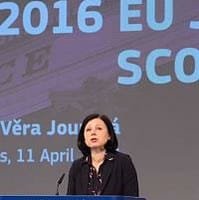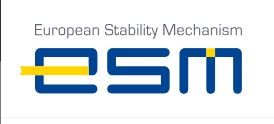(BRUSSELS) – The independence of the judicial systems of EU Member States came under scrutiny on Monday with the EU’s 2016 Justice Scoreboard showing persistently low levels of public trust in some countries.
The Scoreboard gives a comparative overview of the efficiency, quality and independence of justice systems in the EU Member States. Its aim is to help national authorities improve their justice systems.
It does this by looking at three main elements of the EU’s various justice systems. First, the efficiency of the justice systems, the guidelines of proceedings; second, indicators of the quality of the justice systems, such as the type and extent of training of judges or financial resources; finally, the scoreboard looks at how judicial independence is perceived and guaranteed.
A new element of this fourth scoreboard was results from Eurobarometer surveys which looked at the perception of judicial independence in the EU among citizens and businesses in more detail. This edition of the Scoreboard also uses new indicators, in particular on judicial training, the use of surveys, the availability of legal aid and the existence of quality standards.
The Commission’s Justice Commissioner, Vera Jourova, welcomed the progress Member States were making to improve justice systems. She said the length of litigious civil and commercial cases had generally become progressively shorter, with less time being taken to handle a case.
And some Member States who had been struggling with a high number of pending cases have managed to improve in this aspect as well. Ms Jourova specifically welcomed the progress made by Italy, Malta and Latvia in this regard.
She also welcomed progress in the area of the accessibility of justice systems. For example on the availability of the small claims procedure online and of Alternative Dispute Resolution (ADR) methods. And information and communication technologies are being used more widely. She said Slovenia’s reform enabling courts to deliver documents electronically to parties and lawyers saved more than EUR 4.2m in 2016 more than 2 per cent of the courts’ budget. In Romania, since the end of 2015, judgements from all instances are becoming available online.
But there is still room for improvement, with Ms Jourova picking out the need for further efforts to improve training in judicial skills and the use of ICT for case management systems.
However, the new element of judicial independence has drawn much interest.
Bulgaria, for example, is one of the countries with the lowest public trust in the independence of the judicial system – a good example, said Ms Jourova, of how much still needs to be done. One of the reasons for the distrust was frustration in the area of criminal justice, with the public looking for action on the issue of corruption especially.
The figures for Italy showed signs of improvement in the efficiency of the country’s justice system, with the number of pending cases consistently decreasing. But the time needed to resolve litigious civil and commercial cases, while decreasing in 2014, remains amongst the longest.
As concerns the quality of its justice system, there is room for improvement in the areas of courts’ communication policies, use of surveys and use of ICT tools in court. The perception of judicial independence is the third lowest in the EU – both among citizens and businesses.
Perceived independence of the judiciary in Spain also was still low, the fifth lowest ranking among the public, though not quite so bad among business. This has particular importance in the light of cases involving the family of former King Felipe.
The Commission is hopeful that the Scoreboard will encourage the judicial networks to deepen their assessment of the effectiveness of legal safeguards aimed at protecting judicial independence.
It also stresses the importance of effective justice systems for improving Europe’s investment, business and citizen-friendly environment.
They play a key role in establishing confidence throughout the business cycle, says the Commission. Where judicial systems guarantee the enforcement of rights, creditors are more likely to lend, firms are dissuaded from opportunistic behaviour, transaction costs are reduced and innovative businesses which often rely on intangible assets (e.g. intellectual property rights) are more likely to invest
Further information
Full document available: http://ec.europa.eu/justice/effective-justice/files/justice_scoreboard_2016_en.pdf
Summary of the Justice scoreboard: Factsheet
Annotated graphs with full figures
Questions and answers on the 2016 EU Justice Scoreboard








